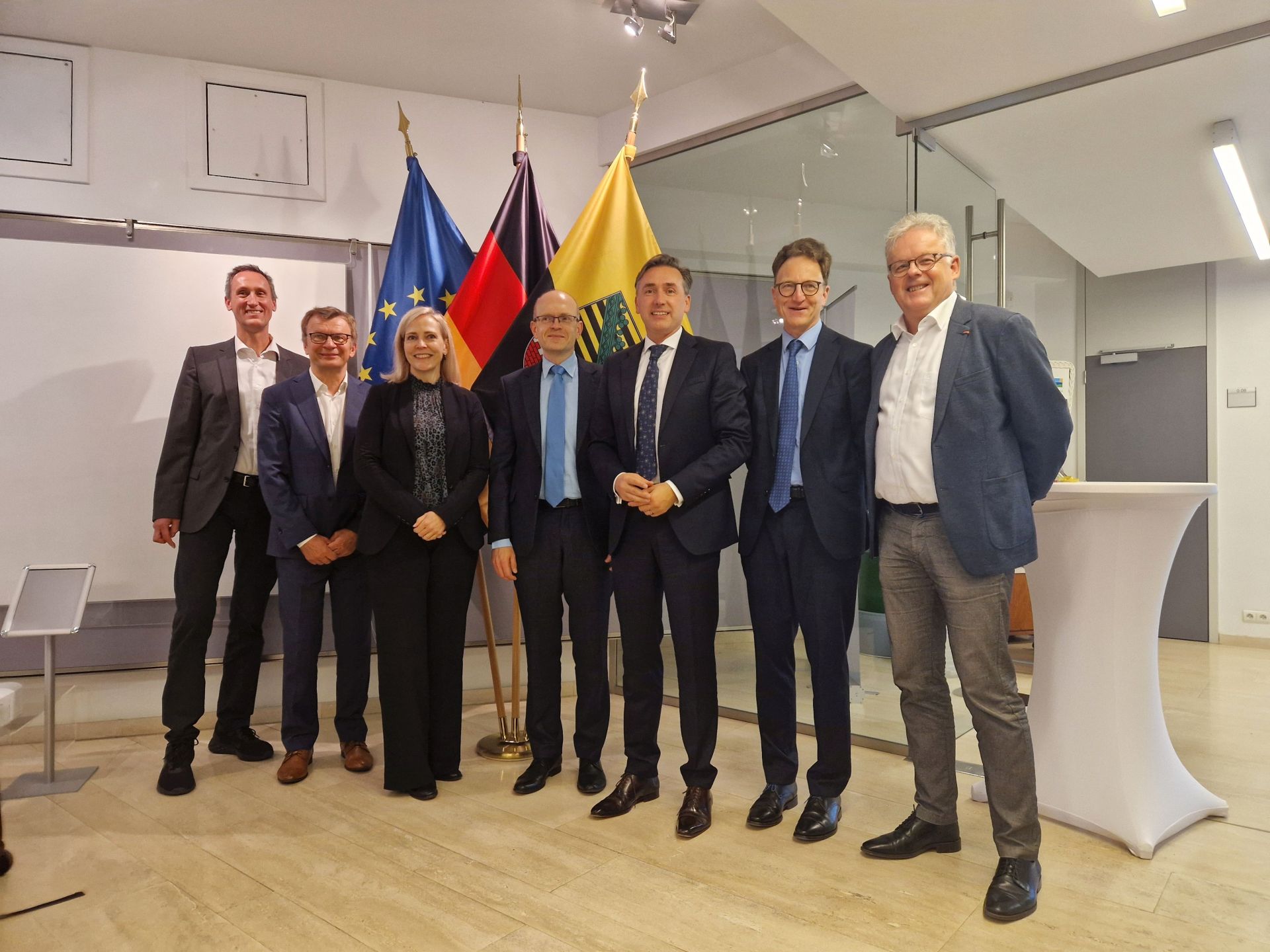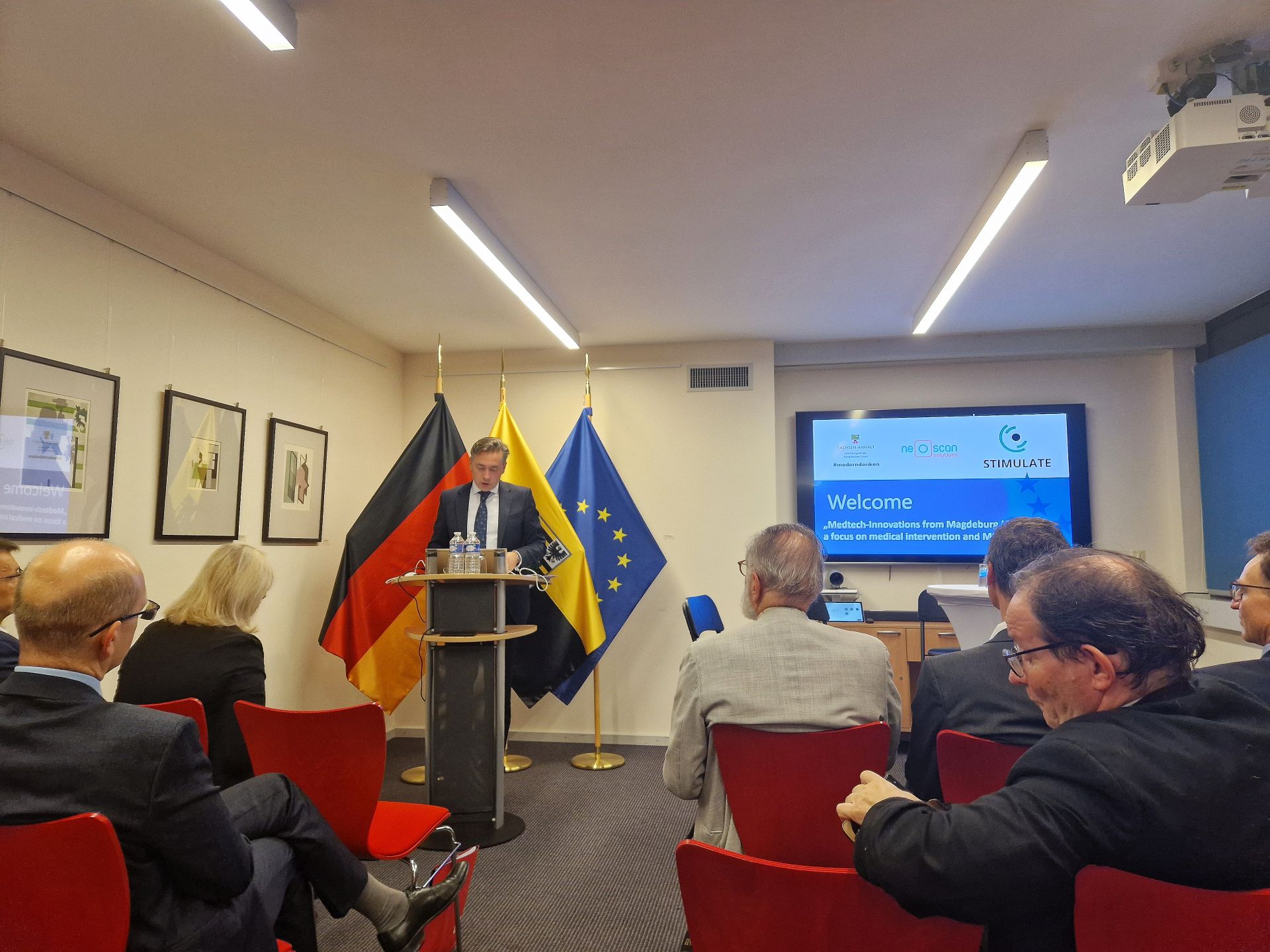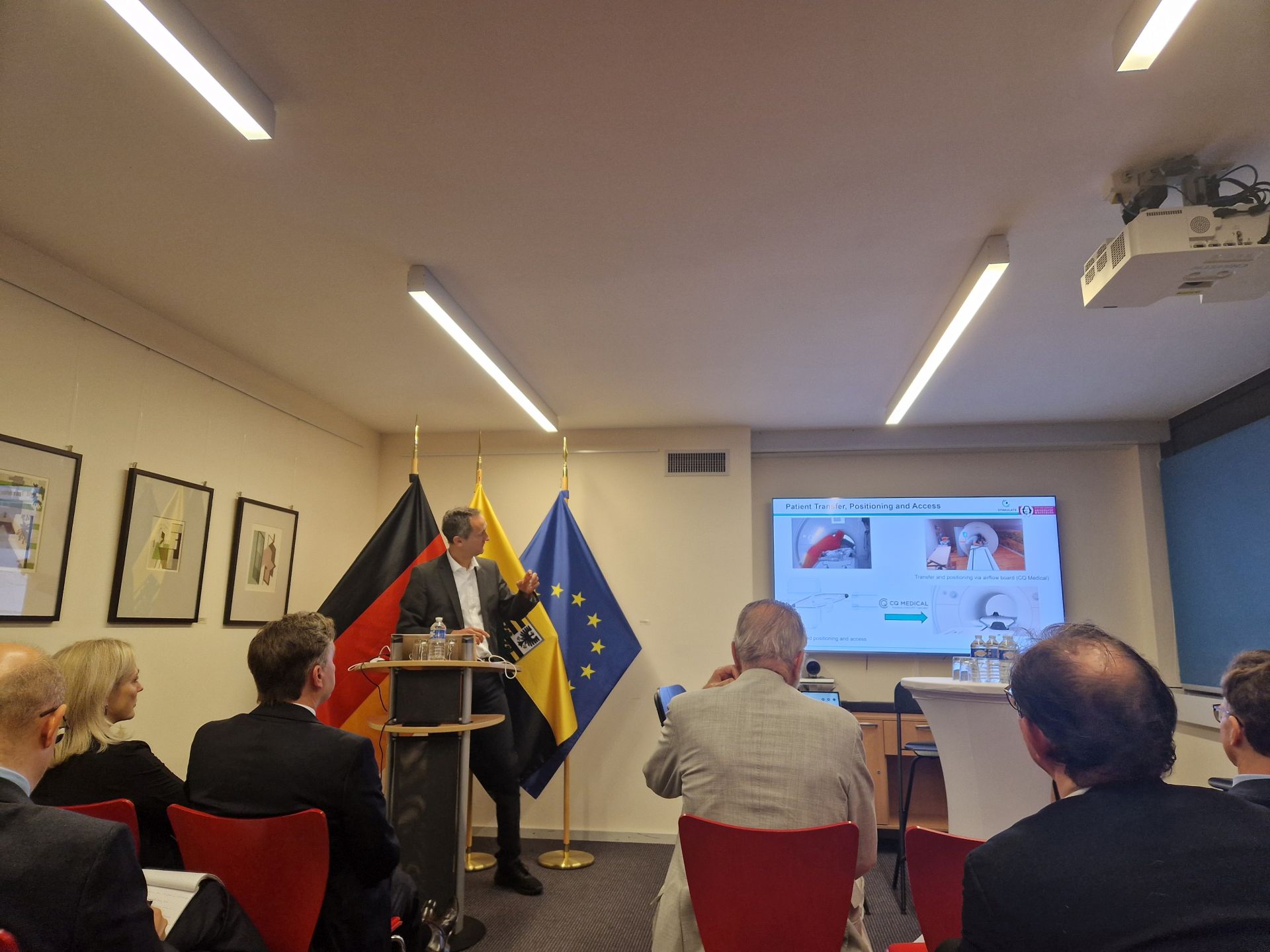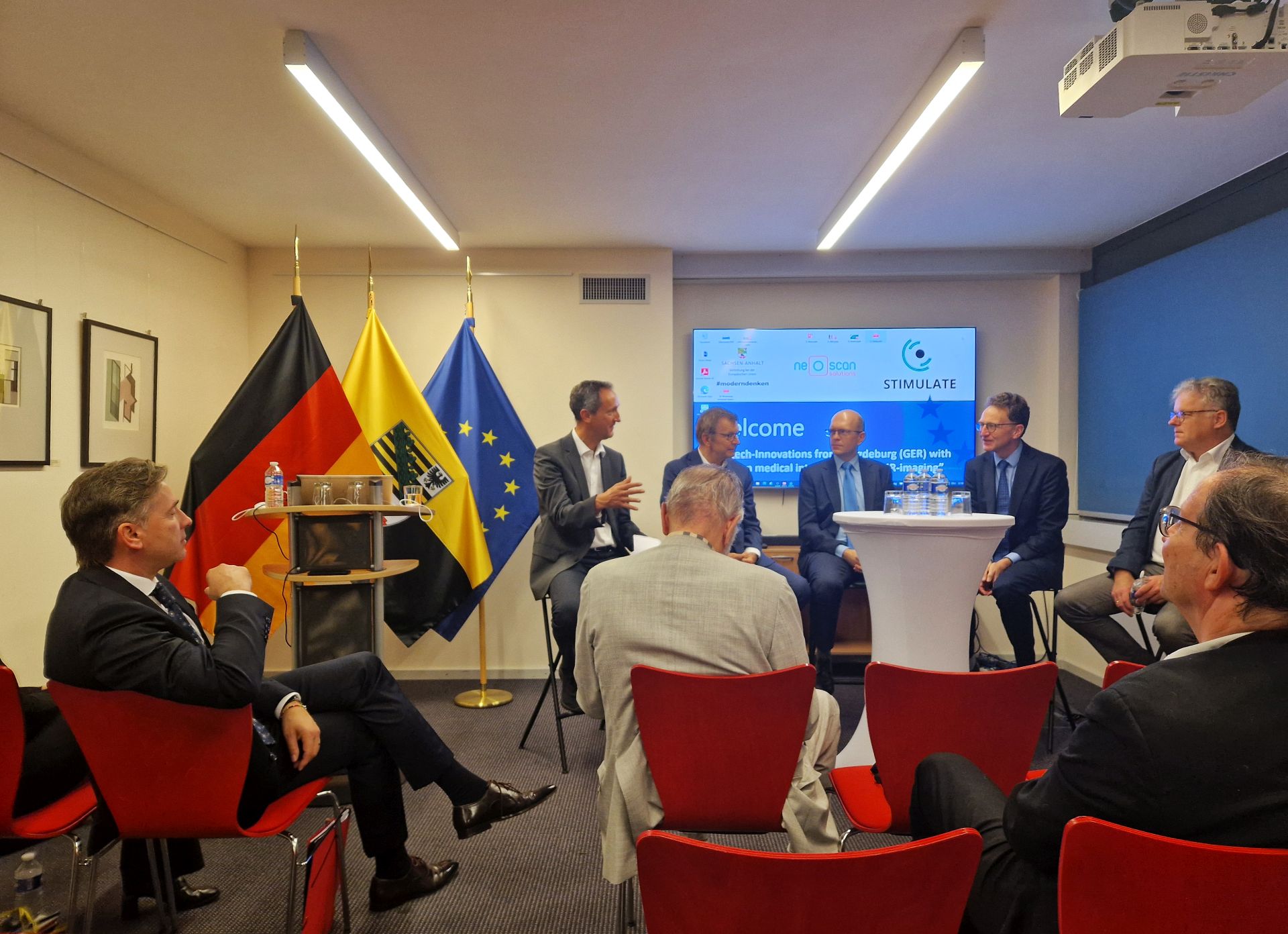NEWS
Magdeburger Medtech-Innovationen in Brüssel vorgestellt
Am 25. Oktober 2024 präsentierte der Forschungscampus STIMULATE der Otto-von-Guericke-Universität Magdeburg im Rahmen der Veranstaltung "Medtech-Innovations from Magdeburg, GER" wegweisende Entwicklungen in der magnetresonanztherapeutischen Medizintechnik. Das Event fand in der Vertretung des Landes Sachsen-Anhalt bei der EU in Brüssel statt und zog Fachleute aus Wissenschaft, Industrie und EU-Behörden an.
Die Eröffnungsrede hielt Carmen Johannsen, die Leiterin der Vertretung Sachsen-Anhalts bei der EU, gefolgt von einem Impulsvortrag von Thomas Wünsch, Staatssekretär im Ministerium für Wissenschaft, Energie, Klimaschutz und Umwelt des Landes Sachsen-Anhalt. Wünsch hob die Bedeutung der Medizintechnik für die Region hervor und betonte die Innovationskraft des Forschungsstandorts Magdeburg.
Als Highlights der Veranstaltung präsentierten Prof. Dr. Georg Rose eine Übersicht über die STIMULATE-Aktivitäten und bisherigen Ergebnisse sowie Prof. Dr. Oliver Speck die neuesten Fortschritte im Bereiche interventionelle Kernspintomographie (MRT). Im Fokus standen dabei die zahlreichen am Forschungscampus erarbeiteten Innovationen im Bereich der MRT-geführten Interventionen, welche das Ziel verfolgen, diese Therapieform in die klinische Routine zu bringen und die klinische Versorgung der alternden Gesellschaft maßgeblich zu verbessern. Dr. Stefan Röll, CEO der Neoscan Solutions GmbH, welche auch Partner im Forschungscampus STIMULATE ist, stellte sein innovatives MRT für Kleinstkinder vor und begeisterte das Publikum mit der Nachricht, im Auftrag der niederländischen Regierung die Hauptkomponente des weltweit ersten humanen 14-Tesla-MRT zu entwickeln. Die Details zu diesem Prestige-Projekt stellte im Anschluss der Leiter des niederländischen Konsortiums, Prof. D.G. David Norris vom Donders Centre for Cognitive Neuroimaging an der Radboud Universität in den Niederlanden vor und skizierte die erwarteten neuartigen Einblicke in das menschliche Gehirn mit Hilfe dieser MRT-Ultrahochtechnologie.
Im Anschluss gab Tomasz Dylag, PhD, Leiter des Health Industry-Sektors bei der Generaldirektion Forschung und Innovation der Europäischen Kommission, einen Überblick über die Innovative Health Initiative (IHI) der EU im Bereich menschenzentrierter Gesundheitsversorgung. Auch ging er auf das künftige HORIZON 2025 WORKPROGRAM der EU Challenge Health ein, welches derzeit noch nicht veröffentlicht ist. Jedoch sind in Bälde erste Ausschreibungen zu erwarten, wenn die künftige EU-KOM im Amt ist. Er zeigte Pfade für einschlägige Bewerbungen im Rahmen von EU-weiten Konsortien auf und bot im weiteren Verfahren unter Verweis auf die üblichen Erfolgsquoten Unterstützung an.
Den Abschluss der Veranstaltung bildete eine gemeinsame Podiumsdiskussion zum Thema „Imaging and Intervention“, moderiert von Prof. Dr. Oliver Speck. Die Teilnehmenden diskutierten über die Erstellung und Erfolgschancen von EU-Förderanträgen und hatten die Möglichkeit, sich über die neuesten Entwicklungen in der bildgebenden und interventionellen Medizintechnik auszutauschen. Das Event war ein bedeutender Schritt zur Stärkung des wissenschaftlichen Austausches auf europäischer Ebene und zur Positionierung des Forschungscampus STIMULATE - unter maßgeblicher Beteiligung des Magdeburger Medtech-KMU Neoscan Solutions GmbH - als führendes Zentrum für medizintechnisch bildgeführte minimal-invasive Interventionen in Europa. Das Event wurde von allen Beteiligten mit Blick auf Zukünftiges in der EU als sehr zielführend eingeschätzt. STIMULATE plant in 2025 eine analoge Veranstaltung in Brüssel mit dem Fokus auf Computertomographie (CT) in Verbindung mit minimal-invasiver medizinischer Intervention.
Magdeburg medtech innovations presented in Brussels
On 25 October 2024, the Research Campus STIMULATE at Otto-von-Guericke-University Magdeburg presented pioneering developments in magnetic resonance therapy medical technology at the "Medtech Innovations from Magdeburg, GER’ event. The event took place at the Representation of the State of Saxony-Anhalt to the EU in Brussels and attracted experts from science, industry and EU authorities.
The opening speech was given by Carmen Johannsen, Head of the Saxony-Anhalt Representation to the EU, followed by a keynote speech by Thomas Wünsch, State Secretary in the Ministry of Science, Energy, Climate Protection and the Environment of the State of Saxony-Anhalt. Wünsch emphasised the importance of medical technology for the region and highlighted the innovative strength of Magdeburg as a research location.
As highlights of the event, Prof Dr Georg Rose presented an overview of the STIMULATE activities and results to date and Prof Dr Oliver Speck presented the latest advances in the field of interventional magnetic resonance imaging (MRI). The focus was on the numerous innovations developed at the Research Campus in the field of MRI-guided interventions, which aim to bring this form of therapy into clinical routine and significantly improve clinical care for an ageing society. Dr Stefan Röll, CEO of Neoscan Solutions GmbH, which is also a partner in the Research Campus STIMULATE, presented his innovative MRI for very young children and thrilled the audience with the news that he had been commissioned by the Dutch government to develop the main component of the world's first human 14 Tesla MRI. The details of this prestigious project were then presented by the head of the Dutch consortium, Prof. D.G. David Norris from the Donders Centre for Cognitive Neuroimaging at Radboud University in the Netherlands, who outlined the expected novel insights into the human brain using this MRI ultra-high technology.
Tomasz Dylag, PhD, Head of the Health Industry Sector at the European Commission's Directorate-General for Research and Innovation, then gave an overview of the EU's Innovative Health Initiative (IHI) in the field of people-centred healthcare. He also discussed the future HORIZON 2025 WORKPROGRAMME of the EU Challenge Health, which has not yet been published. However, the first calls for proposals can be expected in the near future once the future EU Commission is in office. He pointed out paths for relevant applications within the framework of EU-wide consortia and offered support in the further procedure, referring to the usual success rates.
The event concluded with a joint panel discussion on the topic of ‘Imaging and Intervention’, moderated by Prof Dr Oliver Speck. The participants discussed the preparation and chances of success of EU funding applications and had the opportunity to exchange views on the latest developments in imaging and interventional medical technology. The event was an important step towards strengthening scientific exchange at European level and positioning the Research Campus STIMULATE - with significant participation from the Magdeburg medtech SME Neoscan Solutions GmbH - as a leading centre for medical image-guided minimally invasive interventions in Europe. The event was rated by all participants as very effective with a view to the future in the EU. STIMULATE is planning an analogue event in Brussels in 2025 with a focus on computed tomography (CT) in connection with minimally invasive medical intervention.



